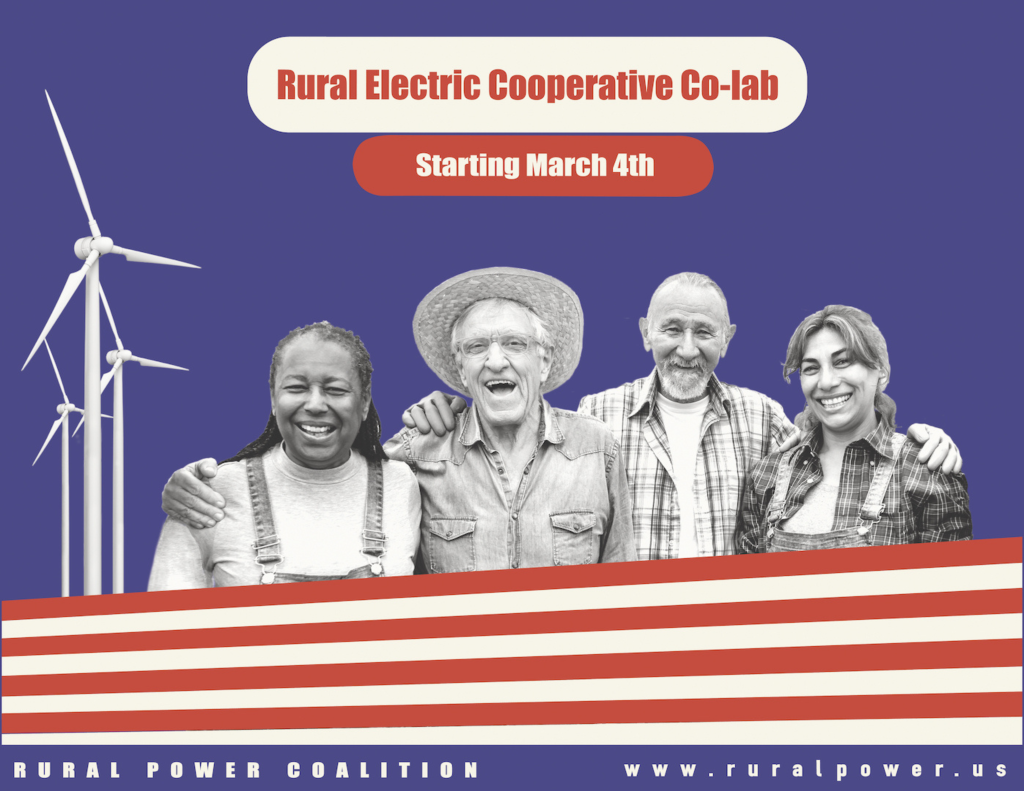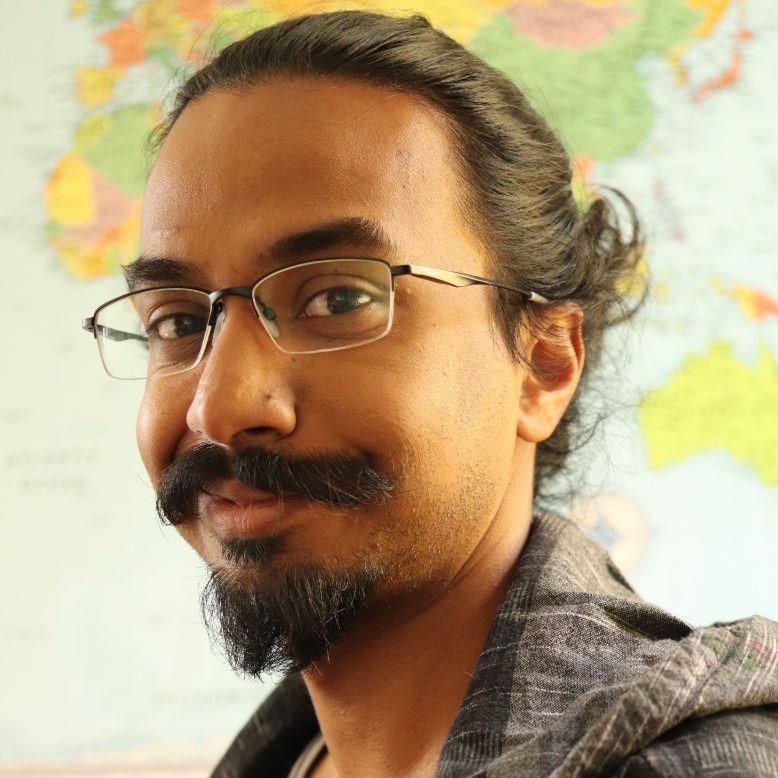It’s 2025. That fact alone is a lot to deal with in the United States, especially for those who understand the urgent imperative to transition to a just, democratic, and inclusive energy system, powered by clean, renewable energy.
With the current administration ideologically committed to toxic and inefficient forms of energy of the past—fossil fuels and fossil fuel infrastructure—even thinking about the energy system might feel dispiriting.
That is, until you realize that most of the United States’ landmass is covered by cooperative utilities that are just waiting for residents to get activated and get involved. Not only do rural electric cooperatives cover a majority of the US, serving 42 million people while powering over 20 million homes, farms, and businesses, but they also are, in fact, cooperatives.
This means that member-owners can get involved in the governance of rural electric cooperatives and shape their local energy ecosystem.
To deepen the understanding of how to do that, Shareable and the Rural Power Coalition are launching the Rural Electric Cooperative Co-lab at the beginning of March 2025.
The stakes couldn’t be higher. A total investment of $40 billion in the Just Transition hangs in the balance!
What gives us hope is that the funding for electric co-ops is actually something that could be successfully defended.
But it will take a lot more people, organizations, and rural farms and businesses to get involved—and quickly.
The Co-lab will commence on Tuesday, March 4th, with an Introduction to Rural Electric Cooperatives. This first session will explain the basics of what electric co-ops are, a little bit of their history, and how they offer enormous potential to increase democracy in our energy system, and can use the cooperative decision-making power of the people to supercharge the energy transition.
The following seven sessions in this learning series will explore topics like grid reliability, funding sources and financing mechanisms, governance and elections, engaging policymakers, community benefits, and much more.
Each session will be led by multiple issue-area experts. The sessions will take place on Tuesdays at 1pm PT/4pm ET for eight weeks. The full list of sessions is listed below.
For more information about the series, electric co-ops, and the Rural Power Coalition, visit: www.ruralpower.us/colab
The Co-lab is free, and participants can choose to attend all sessions or drop in for specific topics of interest. Registration is open to anyone who wishes to learn more about how electric co-ops work and how to engage with them.
Register Now
Co-lab Schedule
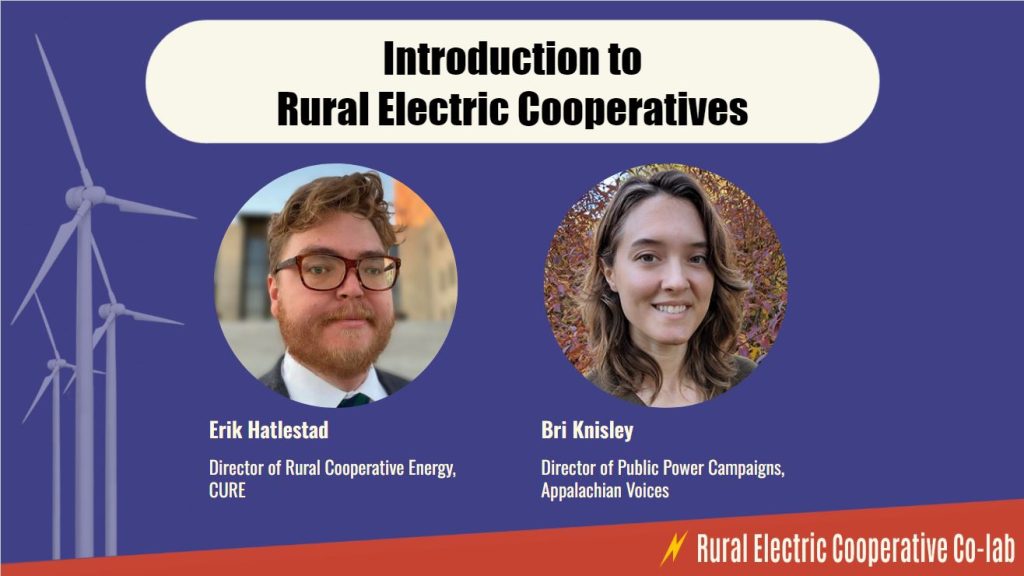
March 4: Introduction to Rural Electric Cooperatives
In this first co-lab session held on Tuesday, March 4th, presenters will explain the basics of what Rural Electric Cooperatives are, a little bit of their history, and how they offer enormous potential to increase democracy in our energy system and supercharge a Just Transition.
Presenters:
- Erik Hatlestad- Director of Rural Cooperative Energy, CURE
- Bri Kinsley- Director of Public Power Campaigns, Appalachian Voices
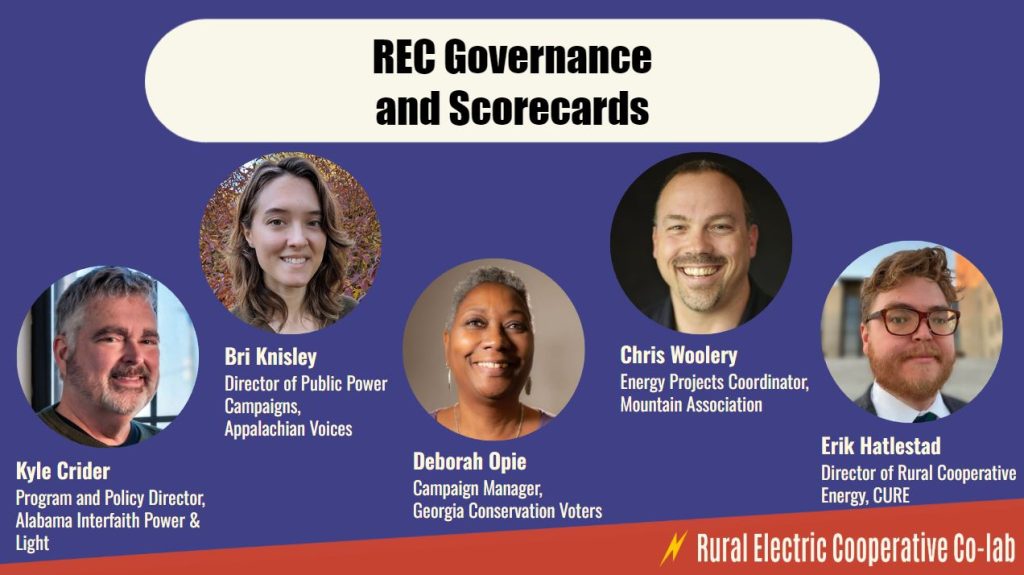
March 11: REC Governance and Scorecards
In this second session, held on Tuesday, March 11th, presenters will discuss how Rural Electric Cooperatives are governed (and how to participate) and how they can be transparently assessed and benchmarked.
Presenters:
- Chris Woolery- Energy Projects Coordinator, Mountain Association
- Erik Hatlestad- Director of Rural Cooperative Energy, CURE
- Kyle Crider- Program and Policy Director, Alabama Interfaith Power & Light and The People’s Justice Council
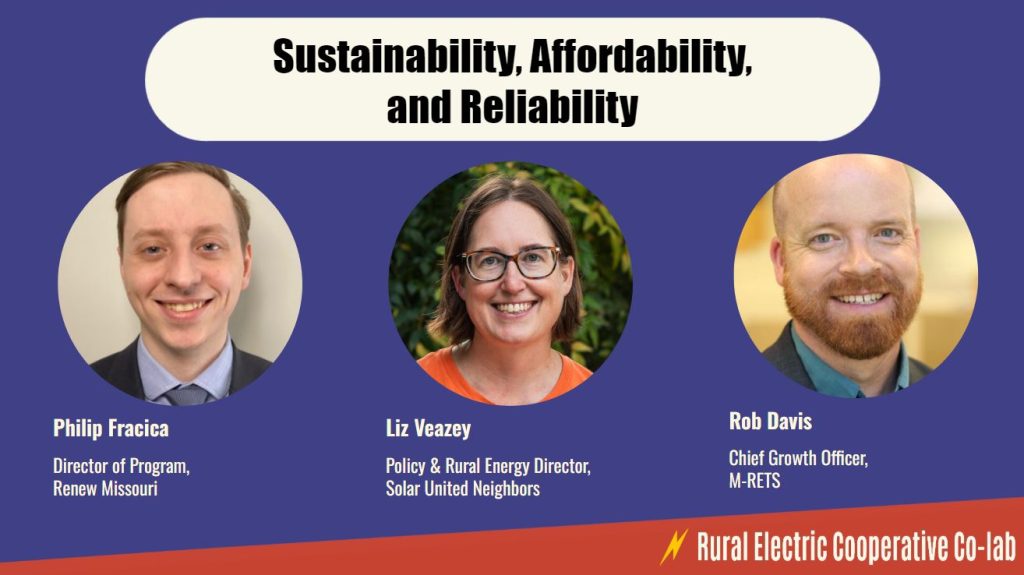
March 18: Sustainability, Affordability, and Reliability
This third session will explore topics of sustainability, affordability, and reliability in energy generation and distribution including virtual power plants, agrivoltaics, battery storage, and more.
Presenters:
- Philip Fracica- Director of Programs, Renew Missouri
- Liz Veazey- Policy & Rural Energy Director, Solar United Neighbors
- Rob Davis- Chief Growth Officer for M-RETS, North America
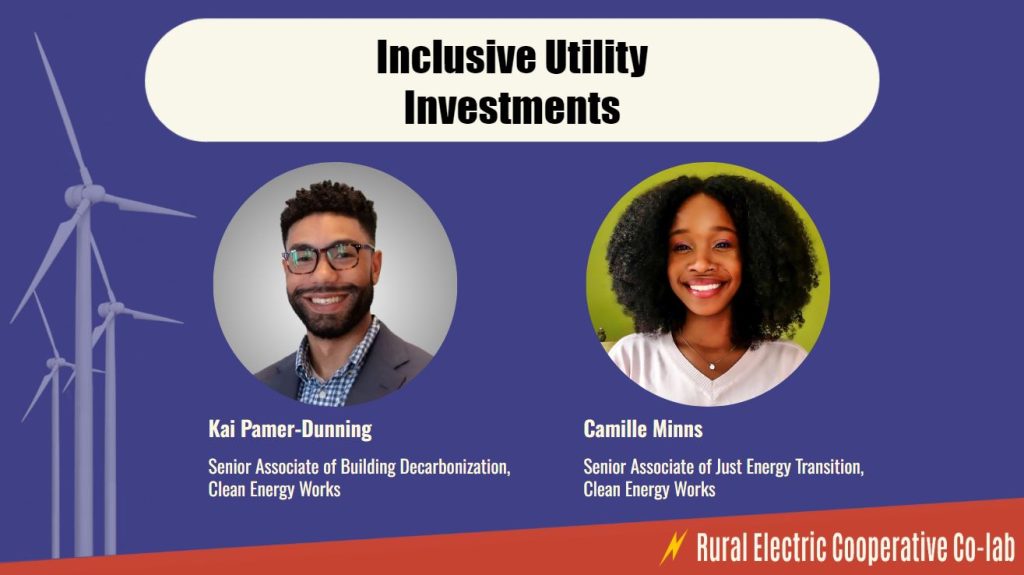
March 25: Inclusive Utility Investments
In this fourth session, presenters will explore inclusive utility investments, an equitable financing mechanism that enables a broader portion of the population to reap the benefits of energy efficiency upgrades and clean energy.
Presenters:
- Kai Palmer-Dunning- Senior Associate of Building Decarbonization, Clean Energy Works
- Camille Minns- Senior Associate of Just Energy Transition, Clean Energy Works
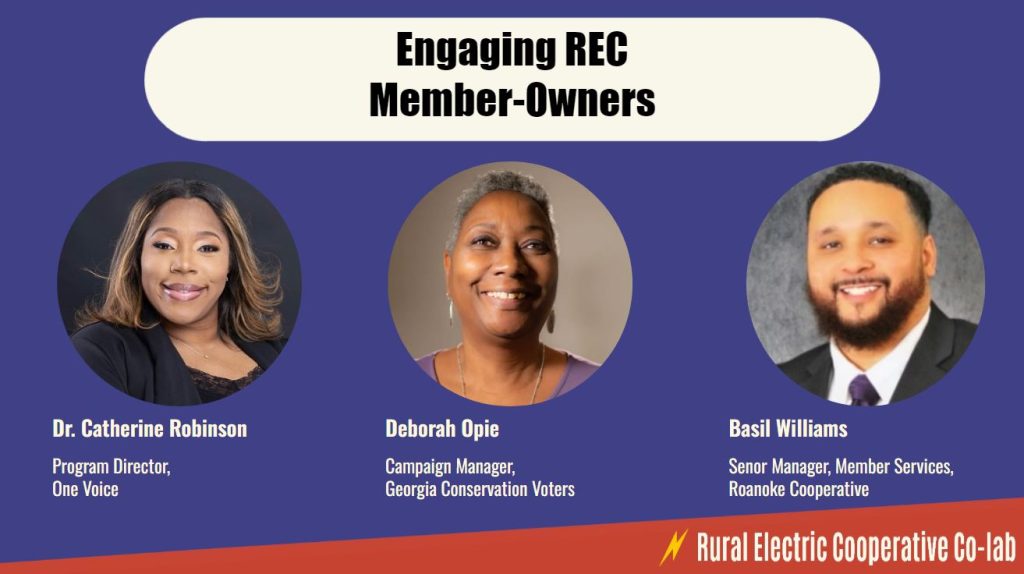
April 1: Engaging REC Member-Owners
In this fifth session, presenters will focus on how to increase democratic participation in the energy system, drawing from their work and experiences in this realm.
Presenters:
- Dr. Catherine Robinson- Program Director, One Voice
- Deborah Opie- Campaign Manager, Campaign Manager
- Basil Williams- Sr. Mgr, Member Services, Roanoke Cooperative
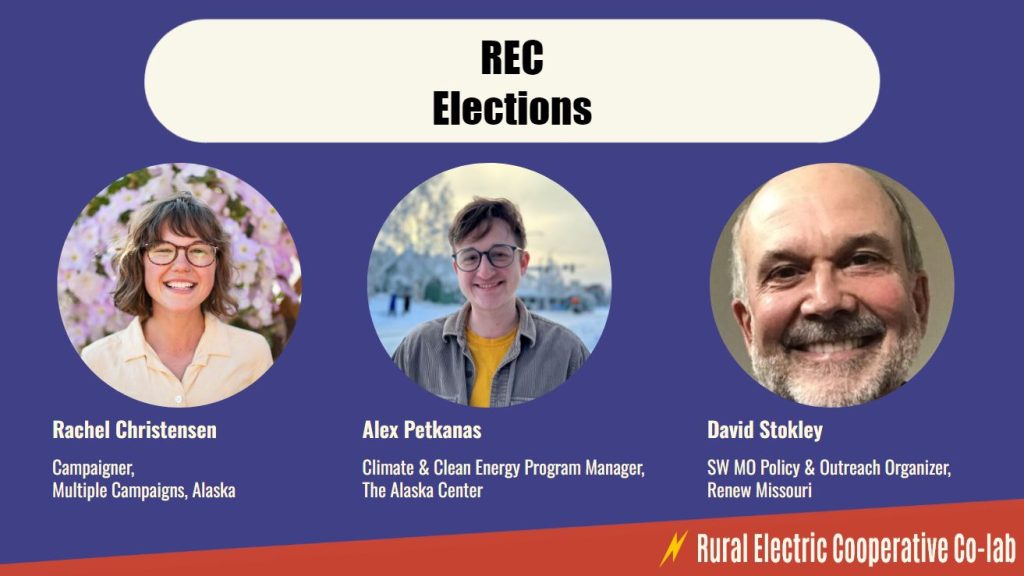
In this sixth session presenters will dive into how democratic Rural Electric Cooperative elections are run and how to get engaged in them.
Presenters:
- Rachel Christensen- Organizer, Multiple Campaigns
- Alex Petkanas- Climate & Clean Energy Program Manager, The Alaska Center
- David Stokley- SW MO Policy & Outreach Organizer, Renew Missouri
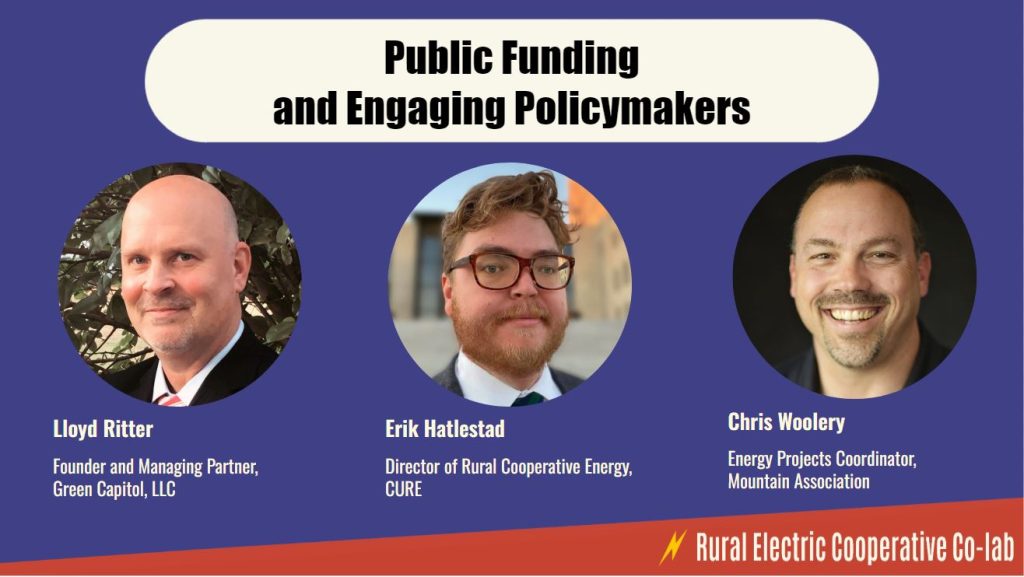
April 15: Public Funding and Engaging Policymakers
This seventh session will focus on how to acquire and retain public funding for Rural Electric Cooperatives and how to engage with policymakers to do so, drawing from the years of experience and success that presenters have in this area.
Presenters:
- Lloyd Ritter- Founder and Managing Partner, Green Capitol, LLC.
- Erik Hatlestad- Director of Rural Cooperative Energy, CURE
- Chris Woolery- Energy Projects Coordinator, Mountain Association
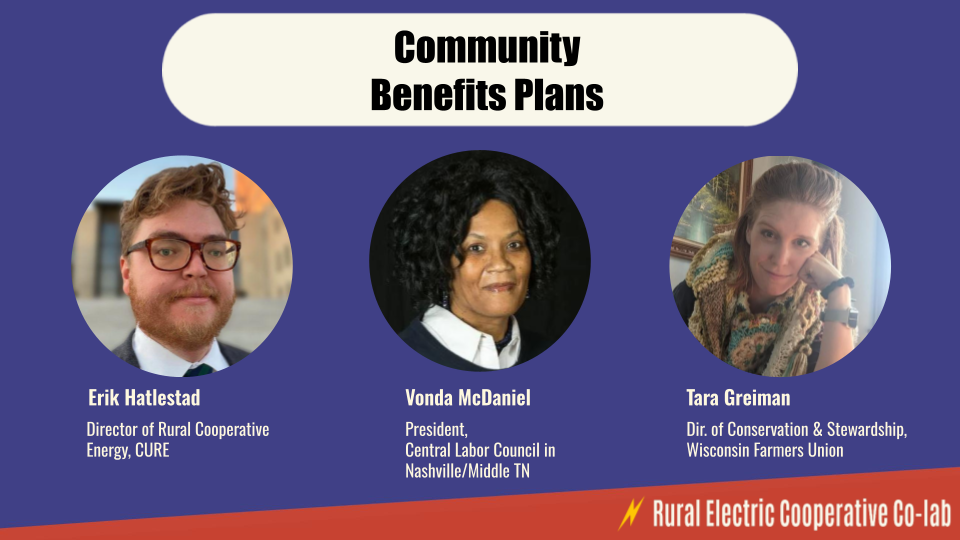
April 22: Community Benefits Plans
In this eighth and final session of the Rural Electric Cooperative Co-lab, presenters and a panel of experienced campaigners and advocates will discuss how to ensure local communities reap the benefits of funding and projects focused on modernizing energy efficiency and energy infrastructure.
Presenters & Panelists:
- Erik Hatlestad- Director of Rural Cooperative Energy, CURE
- Vonda McDaniel- President, Central Labor Council in Nashville/Middle TN
- Tara Greiman- Director of Conservation & Stewardship, Wisconsin Farmers Union
